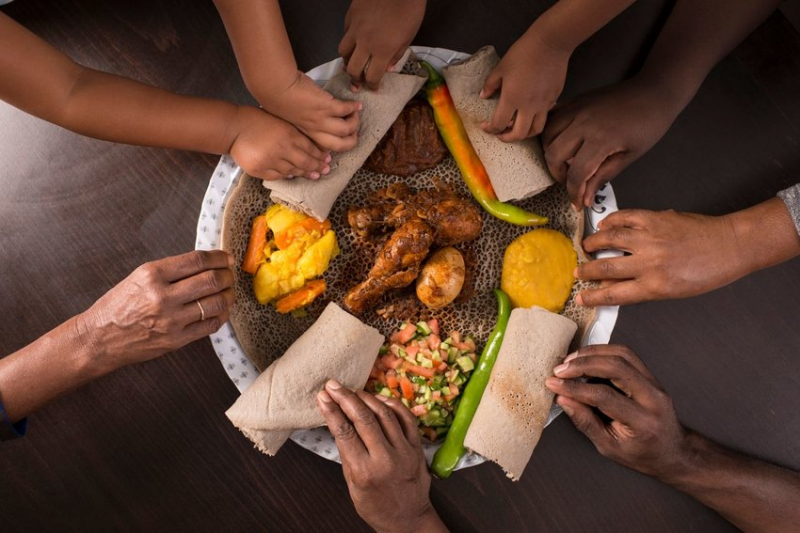Dining Etiquette
You are almost always expected to eat when you visit someone’s house. It is considered rude to decline an offer to eat. If you cannot accept food for a legitimate reason, decline it politely with a bow to show gratitude. It is rude to eat in front of people without offering them any food, especially guests. It is important to wash your hands before a meal is served. Sometimes a bowl will be brought to guests so they can wash their hands at the table. Women should offer to help the female host prepare and clean up after the meal.
People are served in order of their age or status, with the eldest or esteemed guests served first. Hosts may not sit down until their guests have been seated. Wait for people to bless the food with a prayer before you start eating. All guests usually help themselves to food from a shared platter, eating directly from the dish instead of from separate plates. Ethiopian food generally does not require utensils to eat. Everyone normally uses their right hand to serve themselves from a dish, using their fingers to scoop the food. Never pass or eat food with your left hand alone. People often use injera as a scoop. This is a sponge-like pancake that is often used to soak up the remains of food, like a tortilla. It is eaten with almost everything. If given utensils, it is important to hold them towards the end so your fingers do not touch the food.
Guests may be hand-fed the tastiest parts of meals. This process is called ‘Gursha’ and is done out of respect. The host or another person seated at the meal will place the food in the guest’s mouth with their hands. It is polite to smile and accept the offering. It is rude to rush a meal and leave immediately after. In northern Ethiopia, it is polite to leave a little bit of food on your plate to indicate that the host has provided adequately. However, this custom may differ in other regions.
It is common for people to eat similar ingredients for breakfast (kuris), lunch (mesa) and dinner (erat). Common foods include spicy meat stew (wat), bread mixed with sauce (firfir), spaghetti or roasted bread (kita). Lamb, goat and fowl are commonly eaten. However, turkey, pork and ham are not as common. Many Ethiopian Orthodox Christians do not consume any meat or animal products during days of fasting, which includes every Wednesday and Friday. If you are unclear about whether a guest at your meal is fasting or not, it is a good idea to provide a vegan-based option for them to eat. Fish is not prohibited. Ethiopian Muslims do not consume pork or alcohol. Some Pentecostal Christians refrain from drinking alcohol.










